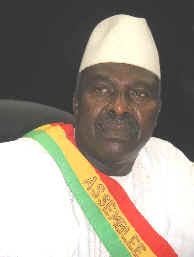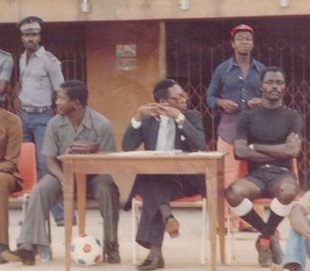The modern state of Guinea did not come into existence until 1958, but the history of the area stretches back well before European colonization. Its current boundaries were determined during the colonial period by the Berlin Conference (1884–1885) and the French, who ruled Guinea until 1958.

Politics of Guinea takes place in a framework of a presidential representative democratic republic, whereby the President of Guinea is both head of state and head of government of Guinea. Executive power is exercised by the government. Legislative power is vested in both the government and the National Assembly.

Ahmed Sékou Touré was a Guinean political leader and African statesman who became the first president of Guinea, serving from 1958 until his death in 1984. Touré was among the primary Guinean nationalists involved in gaining independence of the country from France. He would later die in the United States in 1984.

Lansana Conté was a Guinean politician and military official who served as the second president of Guinea, from 3 April 1984 until his death on 22 December 2008. Conté came to power in the 1984 Guinean coup d'état.

Guinea elects on the national level a head of state—the president—and a legislature. The president is elected for a five-year term by the people through a two-round system. The National Assembly has 114 members, elected for five-year terms, 38 members in single-seat constituencies and 76 members by proportional representation.
Bembeya Jazz National is a Guinean jazz group that gained fame in the 1960s for their Afropop rhythms. They are considered one of the most significant bands in Guinean music. Many of their recordings are based on traditional folk music in the country and have been fused with jazz and Afropop styles. Featuring guitarist Sekou "Diamond Fingers" Diabaté, who grew up in a traditional griot musical family, the band won over fans in Conakry, Guinea's capital city, during the heady days of that country's newfound independence. Bembeya Jazz fell onto harder times in the 1980s and disbanded for a number of years, but reformed in the late 1990s and toured Europe and North America in the early 2000s.

El Hajj Aboubacar Somparé was a Guinean politician who was President of the National Assembly of Guinea from 2002 to 2008. He was previously Guinea's Ambassador to France from 1978 to 1984 and was Secretary-General of the Unity and Progress Party (PUP) from 1995 to 2002.
Camp Boiro or Camp Mamadou Boiro (1960–1984) is a defunct Guinean concentration camp within Conakry city. During the regime of President Ahmed Sékou Touré, thousands of political opponents were imprisoned at the camp. It has been estimated that almost 5,000 people were executed or died from torture or starvation at the camp. According to other estimates, the number of victims was ten times higher: 50,000.

The 2008 Guinean coup d'état occurred in Guinea on 23 December 2008, shortly after the death of long-time President Lansana Conté. A junta called the National Council for Democracy and Development, headed by Captain Moussa Dadis Camara, seized power and announced that it planned to rule the country for two years prior to a new presidential election. Camara did indeed step down after Alpha Condé was elected in the 2010 election.

Captain Moussa Dadis Camara, now called Moïse Dadis Camara, is an ex-officer of the Guinean army who served as the President of Guinea from 23 December 2008 to 15 January 2010. He was the leader of the National Council for Democracy and Development, which seized power in a military coup d'état on 23 December 2008 shortly after the death of long-time president Lansana Conté.

Presidential elections were held in Guinea in 2010. They were held under the two-round system, with the first round taking place on 27 June 2010 and the second round on 7 November, after an initial date of 18 July and several other postponements. Alpha Condé was declared the winner, with 52.52% of the votes in the second round. He assumed office on 21 December 2010.
Mamadou Boye Bah was a Guinean political figure and economist and was one of the leading opponents of the presidents Sékou Touré and Lansana Conté.
Jean-Marie Doré was a Guinean politician who was the prime minister of Guinea from January 2010 until December 2010. Doré, who was the president of the Union for the Progress of Guinea (UPG), was an opposition leader for years before being chosen to head a transitional government that was in place during the preparation and conduct of the 2010 presidential election.

Siradiou Diallo, a Fulani, was a Guinean journalist and politician of the opposition party Union for Progress and Renewal. He was a candidate during the 1993 Guinean presidential election where he received 11.86% of the vote. He also stood for presidency in the 1998 Guinean presidential election and the 2003 Guinean presidential election.

Loffo Camara was a senior Guinean politician and a member of the Politburo of the First Republic of Guinea in the years immediately following independence. After falling out with the President Sékou Touré, she was dismissed from the cabinet, and later was arrested and executed.
Alioune Dramé was a Guinean economist and politician. He also served as an ambassador to Ivory Coast.

Michel Georges Sassine was a prominent Lebanese politician. He was a member of the Lebanese parliament for twenty-four consecutive years (1968–1992) representing the district of Ashrafieh, Beirut. He served several times as Deputy Prime Minister, Deputy Speaker of Parliament, and cabinet Minister. He founded the Ministry of Housing and Cooperatives, and was appointed as Minister of Labor, Tourism and others in more than seven governments. Throughout his political career he was renowned for his strong ethics and anti-corruption principles. He took the lead on several historic turning points including the 1970 Presidential election, and the Taif Agreement in 1990.
The following is a timeline of the history of the city of Conakry, Guinea.

Mory Sinkoun Kaba, known as Kaba Mory or MS, was a Guinean businessman and philanthropist. Close to president Sékou Touré, he realised numerous state projects on his behalf.

The Ministry of Economy and Finance of Guinea is a department of the Government of Guinea in charge of public finances of Guinea.









